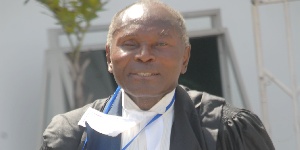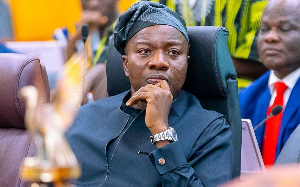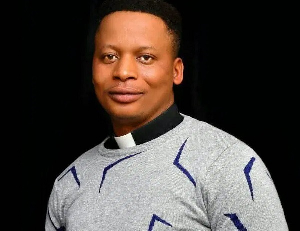After challenging the petition dragging a "sitting president" to court as "frivolous " and complaining about the re-location of the Ghana School of Law library, lawyer Amekudzi's suit has been thrown out again.
Presiding Judge William Atuguba in reading out the ruling said Amekudzi "patently lacked" a proper locus in court, but the court has had to look at the substance of his case.
Nothing has been urged on them to change their earlier position, he read, the applications remained dismissed.
Early on, the "friend of the court", lawyer Amekudzi argued his case.
He called the petitioner’s case “frivolous” and “a dangerous precedent”.
He referred to New Patriotic Party (NPP) vrs President Rawlings and Attorney General, suit number 15 heard on 3rd May 1993, to support his case.
The suit sought to challenge Rawlings for appointing District Chief Executives.
It wasn’t a lawyer who raised an objection, it was actually a panel member of the Supreme Court judge, he disclosed.
A 3-2 majority ruling effectively threw out the suit against the then president, he recalled. This, he believed, was happening again today, which he sought to bring “judicial notice”.
The Supreme Court “should have made a determination” before hearing the case of the petitioners, he charged.
He reminded the court of its “direct slap on the face of justice” on May 7th when the case was first brought to the court, but was dismissed.
It was “twisting and breaking the arm of the constitution” and today should be different, he argued. It should be favourable to prevent the president “litigating against his own citizens,” he advised.
He catalogued the basis of the hearing of the petition as laid out in Article 64, C.I 16. It read:
“(1) The validity of the election of the President may be challenged only by a citizen of Ghana who may present a petition for the purpose to the Supreme Court within twenty-one days after the declaration of the result of the election in respect of which the petition is presented.
(2) A declaration by the Supreme Court that the election of the President is not valid shall be without prejudice to anything done by the President before the declaration.
(3) The Rules of Court Committee shall, by constitutional instrument, make rules of court for the practice and procedure for petitions to the Supreme Court challenging the election of a President.”.
But the court need not get as far as Article 64, he argued. A forerunner provision in Article 57(4) should have arrested the petition, he pointed out.
It read: (4) Without prejudice to the provisions of article 2 of this Constitution, and subject to the operation of the prerogative writs, the President shall not, while in office, be liable to proceedings in any court for the performance of his functions, or for any act done or omitted to be done, or purported to be done, or purported to have been done or purporting to be done in the performance of his functions, under this Constitution or any other law.
(5) The President shall not, while in office as President, be personally liable to any civil or criminal proceedings in court.
How can a constitutional instrument take precedent over an Article such as 57 in the 1992 constitution? An animated Amekudzi quizzed.
If “the court erred” in not taking notice of Article 57, it could right the “error” this time, he appealed.
A judge on the panel was not enthused by Amekudzi’s approach. “Don’t trifle with the court and where is your statement of case?” he demanded.
Another gave a possible explanation for Amekudzi’s predicament. He was “bereaved over the weekend,” he offered.
He got the lawyer to read to the court, details of the procedure for review in C.I 16 rule 56(1) “the application for review shall be by motion supported by affidavit and statement of case. Motion shall be served on notice to all parties.”.
“Does the application comply with this procedure?”, a judge wanted to know.
But Amekudzi said presenting a statement of case meant he was abandoning his case, something he does not want to do. “I don’t want to abandon my case,” he vowed.
He also took the opportunity to complain about the location of the Ghana School of Law library.
Counsel for the petitioners Philip Addison was not interested in providing a counter submission, the court was “capable”, he said. He, therefore, “leaves the matter at hand” to the bosom of the court.
"It adds nothing useful to the case”, Lithur offered and Tsatsu believed Amekudzi was “inter-meddling” with the “able” representation of the president in this court.
Atuguba was charitable. Amekudzi’s case was “not entirely frivolous” or “wishy-washy”. The first ever presidential petition was in 1969, and it was against the Attorney-General.
Nonetheless, after considering the application, the court ruled and dismissed the matter.
General News of Tuesday, 28 May 2013
Source: Joy Online













